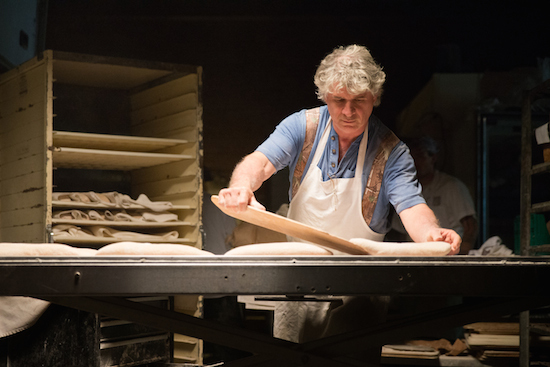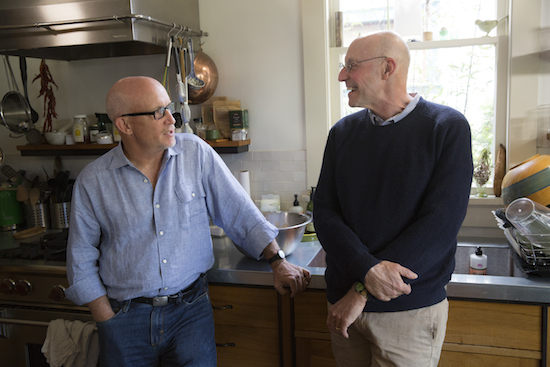Can we vote with our spoon, every day of our lives? And if so, where can I sign up so I can avoid the mistake of electing some of the candidates running for office these days...
Well, the answer to the first question is, in short "yes" as food writer, curator and activist Michael Pollan pointed out during a recent interview in Berlin -- where two episodes of the new series Cooked screened during Berlinale. Food is "a very empowering issue because people can do something about it; you get three votes a day, you can vote with your fork at every meal," Pollan said, then continuing, "compared with a lot of issues where there is less scope of individual action; that's one of the reason it draws young people -- they see some progress and they feel empowered."
It was an interesting debate, touching on this idea of being conscious about the food we eat, as we are or should be about our politicians. In fact, in the room with four other women journalists from different part of the world, the interview with Pollan and Cooked executive producer Alex Gibney became more like a comfy chat among friends.
"I eat meat every day," admitted one journalist from Madrid, while another German colleague squirmed with disgust and declared, "there's no other way out than being a vegetarian," which made us all ask in unison, including Gibney, "no other way out of what?" Disaster we, jokingly but a bit heavily, decided. Perhaps. But Pollan, who has weighed in on all sides of the coin, through his research and in his books, acknowledged, "I am not a vegetarian, I am what is called a flexitarian someone who eats meat maybe once a week..." Pollan explained that he went through what he calls a "process of reflection" when he was working on The Omnivore's Dilemma and that started him looking very closely at sustainable agriculture. Pollan confessed, "I should say I like meat, I like eating meat, but I had misgivings about it," which lead to more research. If only we could all learn from Pollan and instead of declaring our loves and hates on Facebook, we did some homework to find out the truth behind the headlines. But I'm off on a different tangent here. Back to the interviews.
So Pollan, on a sort of existential journey "to be carnivore or not to be carnivore" found that, "on the best farms I visited that were the most innovative and the most humane, they had animals and plants together," Pollan explained, "and there is in nature a nutrient cycle where the animals feed the plants and the plants feed the animals and the best farms recreated that cycle, like at Joel Salatin's farm in Virginia." When asked, by my Spanish colleague, what is more healthy, Pollan didn't hesitate to answer, "vegetables are more healthy." He went on to elaborate that "meat is nutritious food, it has all the amino acids that you need to grow a human body, and there is only one plant we know that does that, quinoa; and meat has vitamin B12 which you can't get from the plant world but you can get from bacteria, but in general, it's about quantity and people do very well on vegetarian diets. They live longer, they have less heart disease but that said, people on a flexitarian diet they're just as healthy as vegetarians." Moderation, once again, is the key to a good life. Lets print that word on a big sheet of paper in bold red letters, and post it on our refrigerators. Life is always better lived in shades of grey, not in black and white.
I had been fortunate enough to catch up earlier with filmmaker Ryan Miller who directed the "Air" episode of this four-part omnibus of films which can be watched on Netflix around the world. Miller admitted that, "certainly filmmakers can be activists, film is an excellent platform to take up a cause, because it's the most powerful storytelling," adding that, "it's a universal method of storytelling." I wanted to understand, as a person interested in cultures around the globes, if and how Cooked could explain some of the shifts and tremors of our current world. While Gibney in "Fire" -- the episode he chose to also direct because he admitted, "it is the origins story, the Prometheus' story, and I'm a big fan of origins stories" -- went back to how cooking made us human and through the element of fire linked the past to the present, Miller's segment reminded me of something else.
Revolutions, wars, all kinds of turmoil in our humanity has always started when grain, the essential source that is the main ingredient in bread, our most basic sustenance, went up too high in price, too fast. In "Air" Miller starts out with a beautiful scene of a mother and son making bread in Morocco, ending the episode with the family meal, as they divide up the fruit of their labors. I asked myself as I watched "Air" if Egypt and Tunisia would have started their Arab Springs, if the French revolution would ever have taken place, or would France still be a monarchy, if Richmond and the American South didn't riot for bread, would the US still be two distinct countries? And how would the world be today? I still haven't come up with the answers, and probably never will, but the opportunity to think and learn while I'm being entertained is one I'll never give up on. Cooked is my kind of film, beautiful, poetic, educational and perfectly human.
So, with such a wide selection of TV shows and series to choose from, why go the Cooked route? Well, for one because it brings together two incredible worldly souls like Alex Gibney and Michael Pollan, who met through their agents but Gibney joked, "we need like a Mick Jagger-Keith Richards story... I saw the albums from across the station and I saw a kindred spirit..." Adding instead that, "yeah, we were having lunch in NY and I'd read a copy of his book and I loved it and we started talking about putting it together as a movie."
But also because of a simple direction that Gibney gave all his directors, according to Miller, "Terrence Malick was a director who Alex referred to as someone who should inspire us... That's a great thing to hear from someone." And the films, each individually stunning and also collectively harmonious, tell a complete tale of our state of nourishment today.
And a final reason to watch Cooked is probably also the reason the series was made, because according to Gibney, the trigger was for him, "the idea that it wasn't about cooking as a kind of a hobby or as an activity, it was the idea of cooking as an understanding of who we essentially are as human beings." To better understand ourselves, lets look in our plate. Do you like what you see?
All images courtesy of Netflix, used with permission.


